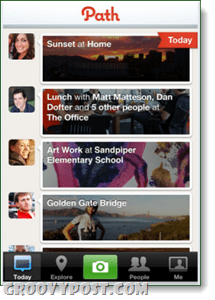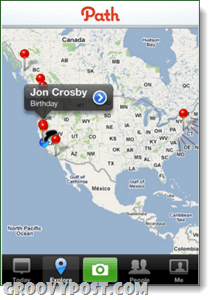This past week we’ve seen a lot of buzz around the social network that just popped up on the grid: Path. After seeing that they had acquired path.com, a domain name which was without a doubt very much taken before they got to it, I had to take a look for myself. After all, anything has to be better than Facebook, right?
What is Path?
I remember hearing Conan O’Brien talking about how one day “YouTube, Twitter and Facebook will merge to form one super time-wasting website called YouTwitFace.” Path isn’t exactly a YouTwitFace, but it does combine parts of Twitter with what you’d find on Facebook. Sporting an all-star development team, including Napster Founder Shawn Fanning and former Facebooker Dave Morin, Path is a new social network for sharing what you’re doing and what you’ve been up to with family and friends. However, unlike Facebook or MySpace, users are capped at 50 total contacts. The idea is that with these restrictions, you will likely add only the people that are close to you, and thus be more likely to share things such as your location and, even more critically, photos. Path really revolves around photo sharing. The service encourages you to post pictures of everything, from self-portraits and action shots to artsy photos of your breakfast or your dog SnookUms. Your picture feed functions much like a Twitter feed, with a thumbnail (more like a cropped teaser of the photo) serving as the background for a very spare snippet of text. I imagine it is only a matter of time until they include videos as well. Also, as of now it only works on the iPhone but they do plan on expanding it to Android and other platforms.
Is Path Really Private?
Path certainly goes out of its way to exude a private atmosphere–but is it all smoke and mirrors? True, Path doesn’t hold your personal information hostage to a byzantine system of privacy controls like Facebook does, and they do promise that no more than 50 people will be able to see your profile. But what about Path itself? As the host, Path takes responsibility and maintains control over all the data that you upload to the social network–and who’s to say that they’ll be good stewards of your personal data? First off, let’s examine the Path Privacy Policy, which looks like it could very well leave your data up for sale to the highest bidder: According to the above section of the Privacy Policy, they can use your personal information for advertising. When you combine that with the last line, it is dubiously vague and leaves A LOT of room for interpretation. Essentially, they could do whatever they want with your data, as their “purpose” is not defined anywhere. If you go up to a previous section in the Privacy Policy, they also state that they collect “information you voluntarily provide” which is really everything and anything you do on the site.
to provide our services or information you request, and to process and complete any transactions;respond to your emails, submissions, questions, comments, requests, and complaints and provide customer service;to monitor and analyze site usage and trends, and to personalize and improve our site and our users’ experiences on our site, such as providing ads, content, or features that match their profiles or interests, and to increase our site’s functionality and user friendliness;to send you confirmations, updates, security alerts, and support and administrative messages and otherwise facilitate your use of, and our administration and operation of, our site; andfor any other purpose for which the information was collected.
The rest of the Privacy Policy isn’t particularly solid either. But there are a few other things that raise red flags as well.
Path Automatically Pulls your iPhone Contacts
When you download and run the Path app on your iPhone, it automatically has a huge list of suggestions of people for you to “friend.” Where did they get that list from? fr8d on Twitter called it right away–Path automatically reads and stores your iPhone contact data without asking. I don’t even think the Facebook app goes that far…
Anyone Can Tag You and Share a Photo of You with Anyone
Obviously, when you share a photo anywhere on the Internet, it’s out there. It only takes one person to download it and post it on a public site for it to irrevocably escape your control. In other words, it’s no longer private and it never will be again. With Path, or any social networking site, that’s definitely a liability. But with Path, the promise that only your close circle of 50 friends will see photos of you isn’t exactly unconditional. For instance, if you are on Path, and someone tags a photo of you, the owner of the photo can then share that with anyone in their 50 contacts, and so on.
Conclusion
Path is a hip new social network with an intuitive, if not intriguing, streamlined photo-sharing and location sharing platform. But, take the “personal and private” veneer that Path is hyping with at least one grain of salt. Path is clearly working an angle here by tapping into the unease surrounding social network privacy, but at the same time, they are leaving themselves plenty of outs in their own privacy policy. Bottom-line: you shouldn’t expect any more privacy with Path than you would get from Facebook or any other online networking site. Should you try it out? sure… but be sure to let us know here what ya think of it! Comment Name * Email *
Δ Save my name and email and send me emails as new comments are made to this post.



